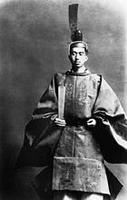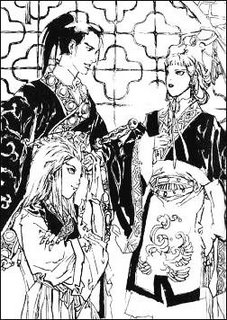October 29, 2005
Chapter 8 (A Thousand Leagues of Wind)
As noted previously, the Japanese emperor is never addressed by name (first or last) as are European royalty (e.g. Prince Charles). Posthumously, Japanese emperors are referred to by the name of their era, or nengou, not by name. The era name of Emperor Hirohito's reign (1926-1989) is Showa ("shining peace"), so he is now referred to as the Showa Emperor.
予王 [よおう] Yo-ou, the posthumous name of the Empress Jokaku, whom Keiki served before chosing Youko.
共王 [きょうおう] Royal Kyou
恭国 [きょうこく] Kingdom of Kyou
Labels: 12 kingdoms, wind
October 26, 2005
My Neighbors, the Yamadas
Like the anime series Azumanga Daiou, also based on a 4-panel manga, My Neighbors, the Yamadas is less a cohesive, 100-minute story narrative than a series of loosely-connected comedic vignettes that follow a familiar formula: hard-working Dad, stay-at-home Mom, Brother, Sister, Grandma, and the Family Dog. Set in suburban Osaka rather than Tokyo, it can be compared in tone and style to Fox's animated sit-com series, King of the Hill, which takes place in Texas.
The sentimental, family sit-com material survives translation fairly well. The opening sequence, which delightfully analogizes the beginning of marriage with Mom and Dad racing a bobsled down the side of their wedding cake, also puns off the Japanese fairy tales Momotarou (The Peach Boy) and Kaguyahime (The Bamboo Cutter), and to storks delivering babies to a cabbage patch. But for the most part, these culture references don't obscure the humor.
True, in some scenes, a familiarity with Japanese culture is required to get the punch line. The hagaki speed-sorting scene, for example. A hagaki is a New Year's greeting card. In Japan, the post office stores up all your hagaki cards and delivers them in a big bundle on New Year's day. Other props such as the kotatsu (a cross between a coffee table and an electric blanket) and hanko (a signature stamp) get glossed over in the sub or are just ignored in the dub.
Otherwise, the family sit-com genre speaks in a universal language, and the casting of Jim Belushi makes the English-language dub work remarkably well. His longer monologues come off a bit clumsily due to lip-syncing constraints, but he captures perfectly the grumpy, exasperated repartee that these set comedy pieces demand. Of course, he plays the same part on his sit-com According to Jim. The lot of the beleaguered, middle-class dad is the same everywhere.
The one real failing of the dub is that it does not portray the Mom's (and Grandma's) distinct Kansai (Osaka) accent. To get it the contrast right, she should have at least sounded like Texas-native Peggy Hill (King of the Hill). But the narration by David Ogden Stiers more than makes up for it with his readings of the haiku poems than bracket every segment. The man has a voice like a Stradivarius. I only wish they had compiled all of his readings in the DVD extras.
Labels: anime reviews, personal favs
October 23, 2005
Chapter 7 (A Thousand Leagues of Wind)
玉佩 [おびだま] obidama (nonstandard reading), ornamental jewels worn in the obi or sash of a kimono by the head of state on special occasions.
sinecure n. 1. an office or position requiring little or no work, esp. one yielding profitable returns.
tad n. informal 1. a small child, esp. a boy.
tog n. 1. a coat. 2. Usu.,
Here, 子 (tad) is being used as a diminutive. So 袍 (coat/clothes) + 子 becomes "tad togs" (word order reversed), or how the elite refer to commoner's dress.
玻璃 [はり] Hari, lit. "crystal glass"
麦侯 [ばくこう] Marquis of Baku
浩瀚 [こうかん] Koukan
Kanji that describe clothing often include the koromo radical, a simplification of the kanji for "clothes" (衣). Except for hakama, the following kanji compounds were created by the author.
袴 [はかま] hakama, a divided skirt
袍衫 [ほうきん] houkin, lit. "coat" + "thin kimono"
襦裙 [じゅくん] jukun, lit. "undergarment" + "skirt"
袍子 [ほうし] houshi, lit. "coat" + "child" = "tad togs"
長袍 [ちょうほう] chouhou, lit. "long coat"
Labels: 12 kingdoms, wind
October 19, 2005
Constantine
The big difference is, when writing straight-up apocalyptic action material--even if you're simply cribbing material out of Catholic Eschatology for Dummies--you're going to end up with more and deeper substance than if you're trying to fake up the Meaning of Everything all by yourself. Which is why The Matrix ended up running on empty through the two sequels. There was ultimately no there there.
There's a lot more here here, even if the battle between good and evil comes down to cliched beat-em-up and shoot-em-up sequences. As with most movies these days, it just doesn't look like a Frank Miller comic, it is a comic (though one I've never read). And appropriately, as required by the genre, Constantine takes a simplistic, dualistic, Miltonesque approach to the material (all action movies are exercises in dualism).
Which, of course, means that the devil gets to show up in the last act and chow down on the scenery. It takes a good bad guy to make these movies work, and though most of the villains our hero and heroine battle are special effects monsters, Gavin Rossdale as the creepy Balthazar, Tilda Swinton as Gabriel (with a chip on her shoulder the size of a redwood) and especially Peter Stormare as the devil, make it worth it. I just wish they had more screen time (like, all of it).
I stress that Constantine belongs to the action flick genre, along with, for example, Schwarzenegger's End of Days (which I also enjoyed, so you know where I'm coming from). So that right there has me adjusting my expectations considerably downwards. The reward, as I've mentioned, is that some small aspect of actual Christian theology eventually gets treated seriously and hammered out. Okay, hammered into a twisted wreck, but at least there's metal under the mallet.
Most of the complaints I've read about the movie seems to be that it doesn't make sense and/or that it's not like the comic. I can understand the latter, but don't really care since I've never read the comic. As for it making sense, it made perfect sense to me, but, then, I grew up immersed in this stuff. In fact, all I really want out of this type of movie, besides it not boring me, is that at some point we get a good shot at a Devil and Daniel Webster debate, and here it does deliver.
Constantine's approach is to start more cynical than most—it makes End of Days look downright orthodox—putting it (initially) in the same league as Dogma and the Japanese series Angel Sanctuary (thumbs up on both). The formula is simple: pick some off-beat aspect of the theology and take it really literally. The result hit and miss, but theology is so rarely taken seriously even by the religions themselves that the nugget in the bucket of gravel is worth the digging to me.
Oh, and be sure to watch the credits all the way through for the very last scene.
Labels: apocalyptic fiction, miltonesque, movie reviews, personal favs
October 16, 2005
Chapter 6 (A Thousand Leagues of Wind)
 Rakushun explains the creation myth of the Twelve Kingdoms in chapter 42 of Shadow of the Moon.
Rakushun explains the creation myth of the Twelve Kingdoms in chapter 42 of Shadow of the Moon.Ryou-un (凌雲山), lit. "skyscraping mountain," the general name for the mountains that house the palaces of the king and province lords in each kingdom.
The Japanese-style kanmuri is worn by Shinto priests and by the Japanese emperor on ceremonial occasions, as in this famous photograph of Hirohito's ascension. The kanmuri Youko is wearing in this illustration from the novel is of a more Chinese variety.
 Hanjuu (半獣), lit. "half beast," a person who can switch between human and animal appearance.
Hanjuu (半獣), lit. "half beast," a person who can switch between human and animal appearance.The Sankou (三公), or Three Ministers: Minister of the Left, Minister of the Right, and the Lord Keeper of the Privy Seal (左大臣・右大臣・内大臣). The Ministers of the Left and Right function as the emperor's chief advisors. In terms of chain-of-command, they are each responsible for three ministries of the Rikkan (Administration, Education, Protocol, Defense, Justice, Public Works). The Lord Privy Seal is essentially the king's personal notary public. They show up in Heian Era anime series such as Otogi Zoshi and movies like Onmyoji, usually pulling the strings behind the throne.
The last Imperial Rescript issued by a Japanese emperor was delivered by Emperor Hirohito on 15 August 1945, accepting the Potsdam Declaration and ending the Second World War.
are [2] (âr, är) n. 1. a surface measure equal to 100 square meters, equivalent to 119.6 sq. yds.; 1/100 of a hectare. In Japanese, 畝 (30 tsubo or 99.174 square meters).
"Wood creates Fire." Rokuta is referring to the Chinese philosophy of the Five Elements: wood, fire, earth, metal, water (木・火・土・金・水), according to which wood (blue/green) generates fire (red).
大裘 [だいきゅう] Daikyuu
冠 [かんむり] kanmuri
延麒 [えんき] Enki
尚隆 [しょうりゅう] Shouryuu
六太 [ろくた] Rokuta
楽俊 [らくしゅん] Rakushun
舒栄 [じょえい] Joei
郊祀 [こうし] Koushi, lit. "ritual of the outskirts"
廉王 [れんおう] Royal Ren of the Kingdom of Ren (漣国)
Labels: 12 kingdoms, shinto, wind
October 09, 2005
Chapter 5 (A Thousand Leagues of Wind)
大 木鈴 [おおきすず] Ooki Suzu, the second and third kanji can also be pronounced, "Mokurin," the on-yomi, or Chinese reading
五山 [ござん] lit. the "five mountains" at the center of the world: Suukou (崇高), Kouzan (恒山), Kazan (華山), Kakuzan (霍山), Houzan (蓬山). Rakushun explains their significance in chapter 38 of Shadow of the Moon. As Ono describes them, these five mountains closely align with the actual Five Great Mountains of China.
Although the facility for natural language acquisition (that is, learning a language without formal instruction) deteriorates markedly with puberty, younger teenagers are still capable of achieving high levels of communicative competence. The most common artifact of late acquisition is pronunciation. A favorite example of linguists is Henry Kissinger, who arrived in the United States at age 14 and speaks English with a strong German accent. His brother, two years younger, has no accent.
But even that barrier can be overcome. Listen to Robert Cringely's interview with Max Levchin and keep in mind that Levchin came to the U.S. from Ukraine at age 16. I've personally known several Japanese who didn't live in an "immersion" environment until they attended university in the U.S., and yet, like Levchin, speak English almost accent-free. So it can be done. Or at least you can get close.
In Shadow of the Moon, Heki Rakujin (chapter 51), learns the language as the result of strenuous intellectual effort. In the real world, a child Suzu's age would have blown past him in raw ability in less than three years, probably in less than six months. This emphasis on formal learning reflects a bias in Japanese language education toward what Steven Krashen terms "learning" vs. "acquisition," one reason why Toudai professor Toshiyuki Shiodome states that "there's no country on earth where English language instruction is as bad as it is in Japan."
The key psychological factors at play here are ego permeability, low inhibition and curiosity. (The Tom Hanks character in Volunteers is a case in point.) Suzu's reaction to her new environment vividly and accurately illustrates one of the biggest barriers for a language learner to overcome: "People would just laugh at her when she said she didn't understand what they were saying. Eventually, Suzu stopped talking all together. It was too intimidating either to speak or be spoken to."
But who wouldn't want Ono's equivalent of Douglas Adams's "Babel Fish"? One aspect of Youko's experience that strikes me as spot-on was that despite having her ever-present Hinman to interpret for her, she had to learn the writing system separately. Indeed, for the most part (there are exceptions, and there is a lot of crossover among even disparate abilities), literacy, unlike communicative competence, must be formally learned.
才州国 [さいしゅうこく] Kingdom of Sai
保州 [ほしゅう] Ho Province
塵県 [じんけん] Jin County
琶山 [はざん] Mount Ha
翠微洞 [すいびどう] Suibi Grotto (lit. "cave of delicate green")
扶王 [ふおう] King Fu
梨耀 [りよう] Riyou
赤虎 [せつこ] Setsuko (lit. "red tiger")
笨媽 [ほんま] Honma (lit. "slovenly mare")
玉膏 [ぎょっこう] gyokkou (lit. "jewel oil")
箴魚 [しんぎょ] lit. "proverb fish"
瑶草 [ようそう] lit. "jewel-like grass"
Labels: 12 kingdoms, wind
October 05, 2005
Inugami
The title translates literally as "The Dog Gods," a reference to Shinto deities that can possess and make tools for vengeance of their human subjects. To be sure, no actual dogs show up (they seem to be symbolized by gusts of wind). Rather, this particular family carries the curse of the Inugami who, when provoked, strike out with tragic consequences.
And it is about halfway through the movie when I said to myself, Hey, Oedipus Rex! With a few cultural deviations--Shinto mysticism and a Hatfield/McCoy feud as the dramatic engine--it follows the plot if not to every letter then to enough of them to spell things out. One thing that becomes obvious is how sudsy and shaggy Sophocles' classic really is. No wonder Freud couldn't resist picking up the ball and running all over the field with it.
Once art achieves "classic" status, the cultural morticians drain it of the sinful pleasures packed them into the seats in the good old days. I saw Antigone at Brigham Young University many years ago, one of those productions that tried oh-so-seriously to be "authentic." It was boring as hell. When the play was originally staged it wasn't packed in formaldehyde, it was the talk of the town. Faux "authenticity" turned it into a moldy old museum display.
Inugami, in contrast, crescendos with the kind of over-the-top melodramatic turns that make it hard to take too seriously. Maybe that's the point. When you've got a story about a guy marrying his mother and killing his father and people getting hanged and poisoned--at least no eyes get gouged out--what do you expect? It's Jerry Springer for the cultured classes. A lot of respectable Greeks probably thought the same about Sophocles.
Though unlike the Greek version, while the necessity of proper worship (to prevent the curse from manifesting itself) pervades the story, the conflict is never brought onto an explicitly moral plane. The gun in act one goes off in act three, but more for reasons of self-preservation than the demands of cosmic justice. If there is an object lesson to be learned, it's that it's not a good idea to mess with people with "issues," especially of the ancient family curse variety.
A counter argument is that, from a Confucian perspective, adherence to ritual by itself demonstrates the requisite moral integrity. Indeed, according to the Inugami legends, it is the respect for ritual (or lack thereof) that brings fortune or disaster upon those possessed by the gods.
In any case, apart from religious and ethical implications, Inugami can be viewed as an (rather sordid) documentary about the growing rupture between tradition and the suffocating constrictions of small town life. In this post-industrial age, it is a theme with an almost universal, intensely nostalgic resonance. And considering Japan's plummeting rural population, like America's failing Midwest farming towns, one of no small social importance.
Labels: japan, japanese movie reviews, movie reviews, religion, sex, shinto
October 02, 2005
Chapter 4 (A Thousand Leagues of Wind)
 Maiden grass (miscanthus) is a tall perennial forage grass native to Japan and China. Nowadays, miscanthus sinensis (silver grass) is mostly planted in the U.S. as an ornamental grass. In Europe, miscanthus giganteus (giant miscanthus) is harvested as a biomass fuel.
Maiden grass (miscanthus) is a tall perennial forage grass native to Japan and China. Nowadays, miscanthus sinensis (silver grass) is mostly planted in the U.S. as an ornamental grass. In Europe, miscanthus giganteus (giant miscanthus) is harvested as a biomass fuel.蓬山 [ほうざん] Mt. Hou, not to be confused with the Kingdom of Hou (芳)
月渓 [げっけい] Gekkei, Marquis of Kei, Kingdom of Hou (Kei Province Lord), not to be confused with the Kingdom of Kei (慶)
玉葉 [ぎょくよう] Gyokuyou
坂県 [はんけん] Han County
新道 [しんどう] Shindou
沍姆 [ごぼ] Gobo
里家 [りけ] rike, a foster home for orphans and the aged
浮民 [ふみん] fumin, lit. "floating citizens"
Labels: 12 kingdoms, wind



